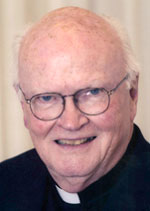I meet monthly as a facilitator for a small group of active and retired business professionals who have one thing in common: a desire to reflect on the relevance of their religious faith to their business and professional responsibilities.
At our most recent meeting, we began, as we always do, with a short Scripture reading followed by a few moments of quiet reflection and then an open exchange of insights prompted by reflection on the text. The reading at our previous meeting was from Ephesians 3:14-21 and the lines that caught the attention of all were the words “that Christ may dwell in your hearts through faith” followed by the assertion that God “is able to accomplish far more than we all ask or imagine.”
Agreement quickly surfaced that recent headlines related to violence locally and in Libya (the murder there of our ambassador and others on our embassy staff), and the different but critically important issues that were neglected in the hoopla of the national Republican and Democratic party conventions, pointed to a crying need for a change of heart at all levels and corners of contemporary society.
We know that God can indeed “accomplish far more than we all ask or imagine.” We can count on that. But as we ask for peace in the world, an end to abortion and an increase in assistance for the poor, we have to wonder how and when divine power will bring about the change of heart needed to translate those dreams into reality.
Persuasion is needed on all these fronts, not threat or coercion. But where are the words and the example that will work to persuade decision-makers that poverty can be eliminated, peace can be achieved and human life, from conception to natural death, will be protected?
The members of my small discussion group are well aware that Christ dwells in their hearts through faith. They know that they have to bring Christ into the workplace and marketplace as well as into the democratic processes of government.
They also know that voting is important, so vote they will. They realize that their presence in the workplace gives God some tools to use in accomplishing here on earth “far more than we all ask or imagine.”
But the enormity of the needs and the evident hardness of so many human hearts relative to so many human needs causes them to wonder. All of us have to get used to thinking of God as big enough, powerful enough, wise enough, good enough and compassionate enough to take care of things.
As someone once remarked, we have God’s work to do here on earth, but we don’t have God’s job. Only God can handle that; we can’t worry about it.
So the rest of us just have to be patient and, more than anything else, faithful. We also have to stay engaged if what God wants to happen is going to happen. Hence the importance of reflecting, even if just once a month, on the relevance of our religious faith to what we do whenever and wherever we go to work.
***
Jesuit Father William J. Byron is university professor of business and society at St. Joseph’s University, Philadelphia. Email: wbyron@sju.edu.
PREVIOUS: Christ, not priest or faithful, is at center of the liturgy, pope says
NEXT: Vatican II texts critical for navigating troubled world, pope says



Share this story